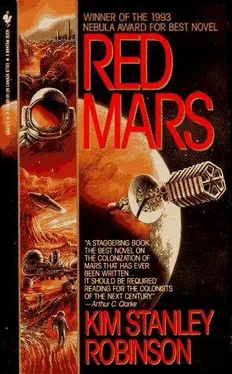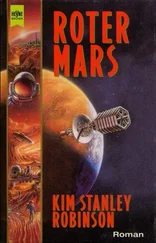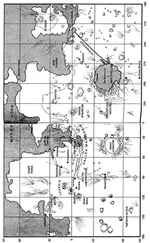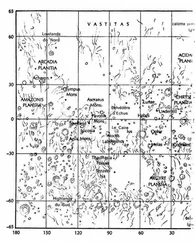“By the thousands?” Frank said.
“Oh yeah! By the tens of thousands!”
He hadn’t looked at TV, he realized, for. . for a long time.
A man doing military presses spoke between lifts of the whole stack of black weights. “It’s gonna blow pretty soon— a lot of people don’t like it— not just old-timers like you— a whole bunch of new-timers, too— they’re disappearing in droves— whole operations— whole towns sometimes— came on a mine in Syrtis— completely empty— everything useful gone— completely stripped— even stuff like lock doors— oxygen tanks— toilets— stuff that’d take hours— to pull loose.”
“Why did they do that?”
“Going native!” a bench presser exclaimed. “Won over by your comrade Arkady Bogdanov!”
From flat on his back this man met Frank’s gaze; a tall, broad-shouldered black man with an aquiline nose. He said, “They get up here and the company tries to look good, gyms and good food and rec time and all, but what it comes down to is them telling you everything you can do and can’t do. It’s all scheduled, when you wake up, when you eat, when you shit, it’s like the Navy has taken over Club Med, you know? And then here comes your bro Arkady, saying to us, You’re Amurricans, boys, you got to be free, this Mars is the new frontier, and you should know some of us are treating it that way, we ain’t no robot software, we’re free men, making our own rules on our own world! And that’s it, man!” The room crackled with laughter, everyone had stopped to listen: “That does the trick! Folks get up here and they see they’re schedule software, they see they can’t keep Earth-buffed without they spend their whole time in here sucking the air hose, and even then I ‘spect it’s impossible, they lied to us I’ll bet. So the pay means nothing, really, we’re all software and maybe stuck here for good. Slaves, man! Fucking slaves! And believe you me, that’s pissing a lot of folk off. They’re ready to strike back, I mean to tell you. And that’s the folks who are disappearing. Gonna be a whole lot of them before it’s all over.”
Frank stared down at the man. “Why haven’t you disappeared?”
The man laughed shortly and began pumping weights again.
“Security,” someone else called from the Nautilus machine.
Military Press disagreed. “Security’s lame— but you got to have— somewhere to go. Soon as Arkady shows— gone!”
“One time,” Bench Press said, “I saw a vid of him where he talked about how folk of color are better suited for Mars than white folk, how we do better with the UV.”
“Yeah! Yeah!” They were all laughing at that, both skeptical and amused at once.
“It’s bullshit, but what the hell,” Bench Press said. “Why not? Why not? Call it our world. Call it Nova Africa. Say no boss is gonna take it away from us this time.” He was laughing again, as if everything he had said was no more than a funny idea. Or else a hilarious truth, a truth so delicious that just saying it made you laugh out loud.
• • •
And so very late that night Frank went back to the Arab rovers, and he continued on with them, but it wasn’t the same. He had been yanked back into time, and now the long days in the prospector only made him itch. He watched TV; he made some calls. He had never resigned as Secretary— the office had been run in his absence by Assistant Secretary Slusinski and the staff, and he had done just enough by phone for them to cover for him, telling Washington that he was working, then that he was doing deep research, then that he was taking a working vacation, and that as one of the first hundred he needed to be out there wandering around. It wouldn’t have lasted much longer, but when Frank called Washington directly the President was pleased, and in Burroughs the exhausted-looking Slusinski looked happy indeed. In fact the whole Burroughs office sounded pleased that he planned to come back, which surprised Frank quite a bit. When he had left Burroughs, disgusted at the treaty and depressed about Maya, he had been, he thought, a bastard of a boss. But here they had covered for him for almost two years, and seemed happy to hear he was coming back. People were strange. The aura of the first hundred, no doubt. As if that mattered.
• • •
So Frank returned from his final prospecting trip and sat that evening in Zeyk’s rover, sipping his coffee, watching them talk, Zeyk and Al-Khan and Yussuf and the rest, and, wandering in and out of the room, Nazik and Aziza. People who had accepted him; people who in some sense understood him. By their code he had done the necessary things. He relaxed in the flow of Arabic, still and always awash with ambiguity: lily, river, forest, lark, jasmine, words that might refer to a waldo hand, a pipe, a kind of talus, robot parts; or perhaps just to lily, river, forest, lark, jasmine. A beautiful, beautiful language. The speech of the people who had taken him in, and let him rest. But he would have to leave.
They had arranged things so that if you spent half the year in Underhill you were assigned a permanent room of your own. Towns all over the planet were adopting similar systems, because people were moving around so much that no one felt at home anywhere, and this arrangement seemed to mitigate that. Certainly the first hundred, who were among the most mobile Martians of all, had started spending more time in Underhill than they had in the years before, and this was mostly a pleasure, to most of them. At any given time twenty or thirty would be around, and others came in and stayed for a while between jobs, and in the constant come and go they had a chance to carry on a more-or-less continuous conference on the state of things, with newcomers reporting what they had seen firsthand, and the rest arguing about what it meant.
Frank, however, did not spend the required twelve months a year in Underhill, and so he did not have a room there. He had moved the department’s head offices to Burroughs back in 2050, and before joining the Arabs in ‘57 the only room he had kept was there in the offices.
Now it was ‘59 and he was back, in a room one floor down from his old one. Dropping his bag on the floor and looking around at the room, he cursed aloud. To have to be in Burroughs in person— as if one’s physical presence made any difference these days! It was an absurd anachronism, but that’s the way people were. Another vestige of the savannah. They lived like monkeys still, while their new god powers lay around them in the weeds.
Slusinski came in. Though his accent was pure New York, Frank had always called him Jeeves, because he looked like the actor in the BBC series. “We’re like dwarves in a waldo,” Frank said to him angrily. “One of those really big waldo excavators. We’re inside it and supposed to be moving a mountain, and instead of using the waldo capabilities we’re leaning out of a window and digging with teaspoons. And complimenting each other on the way we’re taking advantage of the height.”
“I see,” Jeeves said carefully.
But there was nothing to be done about it. He was back in Burroughs, hurrying around, four meetings an hour, conferences that told him what he already knew, which was that UNOMA was now using the treaty for toilet paper. They were approving accounting systems which guaranteed that mining would never show any profits to distribute to the General Assembly members, even after the elevator was working. They were handing out “necessary personnel” status to thousands of emigrants. They were ignoring the various local groups, ignoring MarsFirst. Most of this was done in the name of the elevator itself, which provided an endless string of excuses, 35,000 kilometers of excuses, 120 billion dollars of excuses. Which was not all that expensive, actually, compared to the military budgets of the past century. And most of the elevator funds had been needed in the first years of finding the asteroid and getting it into proper orbit, and setting up the cable factory. After that the factory ate the asteroid and spit out the cable, and that was that; they only had to wait for it to grow long enough, and nudge it down into position. A bargain, a real bargain!
Читать дальше
Конец ознакомительного отрывка
Купить книгу












